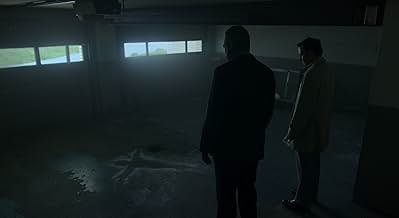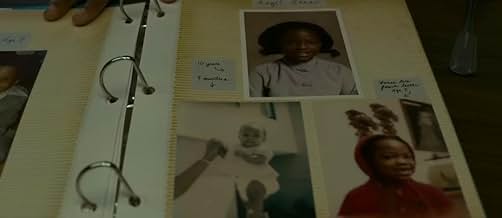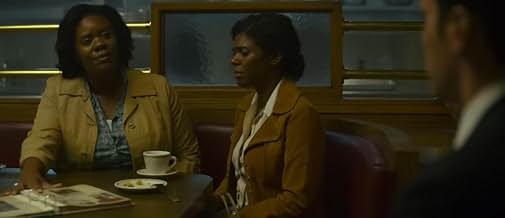Episode #2.3
- Episode aired Aug 16, 2019
- TV-MA
- 1h
IMDb RATING
8.2/10
6.1K
YOUR RATING
Bill gets drawn into a horrifying crime that hits close to home. Holden receives an intriguing offer while in Atlanta to interview a pair of killers.Bill gets drawn into a horrifying crime that hits close to home. Holden receives an intriguing offer while in Atlanta to interview a pair of killers.Bill gets drawn into a horrifying crime that hits close to home. Holden receives an intriguing offer while in Atlanta to interview a pair of killers.
Sierra Aylina McClain
- Tanya Clifton
- (as Sierra McClain)
Featured reviews
This guy is something else, he thinks he knows everything, and apparently doesn't like people he deems unintelligent. Anyway, good storyline and character development.
When Holden goes to Atlanta, he finds himself in the middle of something he hadn't planned on. He encounters the product of racism in the 70's as a trio of black women meet to support each other. They have lost children to violent deaths (one is missing but it is assumed she is gone). Bill is dealing with a tragic death in his neighborhood. A couple interviews are extremely interesting for different reasons.
"Episode 2.3" of Mindhunter, directed by David Fincher and written by Joe Penhall, stands as a compelling and emotionally charged installment that deepens the psychological complexity of the series while advancing its procedural narrative. The episode deftly balances the personal turmoil of the main characters with the harrowing realities of the cases they investigate, further exploring the moral ambiguities and emotional toll inherent in the pursuit of understanding serial killers.
The episode unfolds along two primary narratives. In Atlanta, Holden Ford (Jonathan Groff) teams up with Special Agent Jim Barney (Joe Tuttle) to interview two incarcerated killers, Pierce and another whose identity is gradually revealed. The interviews are fraught with tension, as Pierce exhibits hostility and racial prejudice, particularly towards Barney, creating a charged atmosphere that challenges Holden's usual interviewing techniques. These scenes are marked by sharp dialogue and intense performances, highlighting the difficulties of eliciting truth from manipulative and uncooperative subjects. The dynamic between Holden and Jim provides a fresh counterbalance, with Jim's steady demeanor complementing Holden's more excitable nature.
Meanwhile, back in Virginia, Bill Tench (Holt McCallany) confronts a deeply personal crisis when a tragic incident occurs in his neighborhood: the murder of a toddler in a home listed by his wife, Nancy (Stacey Roca). The discovery that the back door was left open and the ensuing investigation hit close to home, shaking Bill's sense of security and forcing him to grapple with the intrusion of violence into his domestic life. The episode sensitively portrays the emotional fallout within the Tench family, particularly Nancy's guilt and Bill's struggle to maintain professional composure amid personal anguish. These moments provide a poignant counterpoint to the procedural elements, grounding the series in authentic human experience.
Fincher's direction is meticulous and atmospheric, employing a muted color palette and precise framing that evoke the oppressive heat and tension of Atlanta alongside the somber mood of the Virginia scenes. The cinematography captures intimate character moments and the stark realities of crime scenes with equal skill. The editing maintains a deliberate pace, allowing emotional beats to resonate while sustaining narrative momentum. The sound design subtly amplifies the unease and emotional weight permeating the episode.
Thematically, "Episode 2.3" explores the intersection of personal trauma and professional duty, the challenges of confronting systemic and interpersonal prejudice, and the complexities of seeking justice amid societal and familial fractures. The episode interrogates the emotional costs borne by those who investigate humanity's darkest acts, emphasizing the fragile boundaries between public service and private suffering. It also touches on racial tensions and institutional challenges, particularly through the interactions between Holden, Jim, and the interviewees.
Within the broader context of Mindhunter, this episode reinforces the series' commitment to blending factual crime history with psychological insight and character-driven drama. Its nuanced portrayal of real-life figures and cases situates the narrative within a rich cultural and historical framework, inviting reflection on the evolving nature of criminal justice and behavioral science. The episode's focus on the Atlanta child murders introduces a significant and historically resonant case, setting the stage for the season's overarching investigation.
Critically, the episode has been praised for its strong performances, especially by Groff, McCallany, and Tuttle, and for Fincher's masterful direction. Reviewers highlight its atmospheric tension and emotional resonance, though some note the season's slower pacing compared to conventional crime dramas. Nonetheless, the episode is widely regarded as a compelling and thoughtful continuation of the series' exploration of darkness and humanity.
Episode 2.3" exemplifies Mindhunter's strengths as a sophisticated and psychologically rich crime drama. Through meticulous craftsmanship, layered storytelling, and powerful performances, it challenges viewers to grapple with the complexities of evil and the human psyche. The episode not only advances the season's narrative but also deepens the series' meditation on the fragile boundaries between knowledge, empathy, and moral ambiguity, encouraging reflection on the profound personal and societal impacts of violent crime.
The episode unfolds along two primary narratives. In Atlanta, Holden Ford (Jonathan Groff) teams up with Special Agent Jim Barney (Joe Tuttle) to interview two incarcerated killers, Pierce and another whose identity is gradually revealed. The interviews are fraught with tension, as Pierce exhibits hostility and racial prejudice, particularly towards Barney, creating a charged atmosphere that challenges Holden's usual interviewing techniques. These scenes are marked by sharp dialogue and intense performances, highlighting the difficulties of eliciting truth from manipulative and uncooperative subjects. The dynamic between Holden and Jim provides a fresh counterbalance, with Jim's steady demeanor complementing Holden's more excitable nature.
Meanwhile, back in Virginia, Bill Tench (Holt McCallany) confronts a deeply personal crisis when a tragic incident occurs in his neighborhood: the murder of a toddler in a home listed by his wife, Nancy (Stacey Roca). The discovery that the back door was left open and the ensuing investigation hit close to home, shaking Bill's sense of security and forcing him to grapple with the intrusion of violence into his domestic life. The episode sensitively portrays the emotional fallout within the Tench family, particularly Nancy's guilt and Bill's struggle to maintain professional composure amid personal anguish. These moments provide a poignant counterpoint to the procedural elements, grounding the series in authentic human experience.
Fincher's direction is meticulous and atmospheric, employing a muted color palette and precise framing that evoke the oppressive heat and tension of Atlanta alongside the somber mood of the Virginia scenes. The cinematography captures intimate character moments and the stark realities of crime scenes with equal skill. The editing maintains a deliberate pace, allowing emotional beats to resonate while sustaining narrative momentum. The sound design subtly amplifies the unease and emotional weight permeating the episode.
Thematically, "Episode 2.3" explores the intersection of personal trauma and professional duty, the challenges of confronting systemic and interpersonal prejudice, and the complexities of seeking justice amid societal and familial fractures. The episode interrogates the emotional costs borne by those who investigate humanity's darkest acts, emphasizing the fragile boundaries between public service and private suffering. It also touches on racial tensions and institutional challenges, particularly through the interactions between Holden, Jim, and the interviewees.
Within the broader context of Mindhunter, this episode reinforces the series' commitment to blending factual crime history with psychological insight and character-driven drama. Its nuanced portrayal of real-life figures and cases situates the narrative within a rich cultural and historical framework, inviting reflection on the evolving nature of criminal justice and behavioral science. The episode's focus on the Atlanta child murders introduces a significant and historically resonant case, setting the stage for the season's overarching investigation.
Critically, the episode has been praised for its strong performances, especially by Groff, McCallany, and Tuttle, and for Fincher's masterful direction. Reviewers highlight its atmospheric tension and emotional resonance, though some note the season's slower pacing compared to conventional crime dramas. Nonetheless, the episode is widely regarded as a compelling and thoughtful continuation of the series' exploration of darkness and humanity.
Episode 2.3" exemplifies Mindhunter's strengths as a sophisticated and psychologically rich crime drama. Through meticulous craftsmanship, layered storytelling, and powerful performances, it challenges viewers to grapple with the complexities of evil and the human psyche. The episode not only advances the season's narrative but also deepens the series' meditation on the fragile boundaries between knowledge, empathy, and moral ambiguity, encouraging reflection on the profound personal and societal impacts of violent crime.
Holden tested that he can handle the cases for himself. And he passed. By the way, he gives signals that he ready for new relationship or he needs one night stand and relax. The episode is a bit about close relationships. Also look at the late 70's America's racism politics.
Did you know
- TriviaHolden Ford says his name is a bad joke in Australia. In Australia, Ford and Holden are car companies (and racing teams) with passionate, and discrete fan bases. Mindhunter's creator Joe Penhall is from South Australia and created the name as an in-joke for himself and his fellow Australians
- GoofsMultiple cars are shown with front license plates in Georgia. With the exception of Disabled Veteran plates, Georgia has never used front-mounted license plates.
- Quotes
Dr. Wendy Carr: Not really, no.
Dr. Wendy Carr: But if I did, if I did have a night off, is there a place?
Dr. Wendy Carr: For us?
Kay Manz: Are you looking for a tour guide... or a date?
Dr. Wendy Carr: A date.
- ConnectionsReferences The Jeffersons (1975)
Details
- Release date
- Country of origin
- Official sites
- Language
- Filming locations
- Century III Mall, Clairton Rd, West Mifflin, Pennsylvania, USA(Omni International Hotel Lobby & Atrium)
- Production companies
- See more company credits at IMDbPro
- Runtime
- 1h(60 min)
- Color
- Aspect ratio
- 2.20 : 1
Contribute to this page
Suggest an edit or add missing content

























